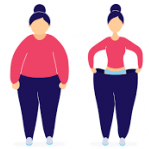-
Content Count
571 -
Joined
-
Last visited
-
Days Won
9
Reputation Activity
-
 Jaelzion got a reaction from I♡BypassedMyPhatAss♡ in Rheumatoid Arthritis
Jaelzion got a reaction from I♡BypassedMyPhatAss♡ in Rheumatoid Arthritis
I have RA as well. I am not allowed to take NSAIDS because I am on anticoagulants, so even before sleeve surgery that was not an option. I take one Norco daily to help manage the joint pain and flare-ups. One a day is enough to keep me reasonably functional, if not completely pain-free. I haven't had any major issues with meds and I am careful not to take more than one per day. I used to take Plaquenil, but I started to have eye problems (which it's known for causing) so I had to stop. My rheumatologist would rather not risk giving me disease-modifying drugs like Humira due to extra risk factors from unrelated conditions. So Norco it is, for now. Is it your primary doctor or a rheumatologist saying you just have to "live with it"? In either case, I'd be looking for a new doctor due to that uncaring attitude.
-
 Jaelzion got a reaction from learn2cook in Complex trauma/ developmental trauma
Jaelzion got a reaction from learn2cook in Complex trauma/ developmental trauma
@Gen71, you have more than a month until your surgery date, so you have time to explore this a bit. If I were you, I'd go to your bariatric program and explain your concerns and how you are feeling. Maybe they can set you up with a psych session just to make sure it's a good idea to go forward with the surgery. I know you said you are in therapy, but not every therapist understands bariatric surgery and how it affects people. It sounds like you are asking whether you will still be able to use food as a coping mechanism and to me that indicates you might not be ready for such a radical change. We've seen an uptick in the number of people who say they regret the surgery and some of them have complained about not realizing what a huge change it was going to be. Best wishes, whatever you decide.
-
 Jaelzion got a reaction from Sunnyway in This surgery is bullshit...
Jaelzion got a reaction from Sunnyway in This surgery is bullshit...
Now that you are logging your intake, can you post a sample of what you eat in a day? Between all of the folks here, there are decades of experience with post-bariatric weight loss. Maybe someone will be able to spot something that could be derailing your progress.
-
 Jaelzion got a reaction from learn2cook in Complex trauma/ developmental trauma
Jaelzion got a reaction from learn2cook in Complex trauma/ developmental trauma
@Gen71, you have more than a month until your surgery date, so you have time to explore this a bit. If I were you, I'd go to your bariatric program and explain your concerns and how you are feeling. Maybe they can set you up with a psych session just to make sure it's a good idea to go forward with the surgery. I know you said you are in therapy, but not every therapist understands bariatric surgery and how it affects people. It sounds like you are asking whether you will still be able to use food as a coping mechanism and to me that indicates you might not be ready for such a radical change. We've seen an uptick in the number of people who say they regret the surgery and some of them have complained about not realizing what a huge change it was going to be. Best wishes, whatever you decide.
-
 Jaelzion got a reaction from Sunnyway in This surgery is bullshit...
Jaelzion got a reaction from Sunnyway in This surgery is bullshit...
Now that you are logging your intake, can you post a sample of what you eat in a day? Between all of the folks here, there are decades of experience with post-bariatric weight loss. Maybe someone will be able to spot something that could be derailing your progress.
-
 Jaelzion got a reaction from Sunnyway in This surgery is bullshit...
Jaelzion got a reaction from Sunnyway in This surgery is bullshit...
Now that you are logging your intake, can you post a sample of what you eat in a day? Between all of the folks here, there are decades of experience with post-bariatric weight loss. Maybe someone will be able to spot something that could be derailing your progress.
-
 Jaelzion got a reaction from DaisyAndSunshine in How spicy do you eat?
Jaelzion got a reaction from DaisyAndSunshine in How spicy do you eat?
In the immediate aftermath of surgery, very spicy food caused me stomach pain. But at this point, coming up on 3 years, I can eat the same degree of spiciness as I could before surgery.
-
 Jaelzion got a reaction from FutureSylph in This surgery is bullshit...
Jaelzion got a reaction from FutureSylph in This surgery is bullshit...
Before surgery, I had been obese since the age of 8. I was 54 when I had the sleeve done. In all those intervening years (decades), I was never able to lose significant weight and keep it off for more than a year (usually 6 months). After surgery, I lost 130 pounds and reached a normal BMI for the first time since I was a little girl. I'm coming up on 3 years since my sleeve and my weight is within 4 pounds of my lowest weight. I had 45 years of trying to lose weight and maintain the loss. If I could have done it on my own, I would have.
To a certain extent, you're right. No surgery will allow you to eat unhealthy food on a regular basis and maintain the weight loss. The part you are missing is that for some of us, the surgery alters our appetite and reduces cravings. That makes it much easier to stick to a desired eating plan. Prior to surgery, my appetite beat me up like it was Mike Tyson. Now, it's more like a toddler. It can make a lot of noise, but it doesn't overpower me anymore. I'm not consistently relying on raw will-power, where I'm constantly struggling not to eat. That wouldn't be at all sustainable (as my 45 years of diets demonstrated). Sure, sometimes I want something bad and I have to tell myself "Not right now". But it's a heck of a lot easier to do that now than it was before surgery.
It's really unfortunate that you were told you would be able to eat as you did pre-surgery. I honestly don't know ANYONE who completely went back to their old diet and maintained their weight loss. Now that I am in maintenance, I'm not as strict as I was during the weight loss phase. I eat more carbs (in the form of fruit mostly) and I allow myself a treat now and then (Thanksgiving, Christmas, my birthday, Passover, etc.) But day to day, I eat a maintenance diet that is very different from how I ate pre-surgery.
Your surgeon is simply wrong. 2 years and 9 months after surgery, I still have significant restriction and my appetite is still about two-thirds of what it was before. The restriction is not as intense as it was in the early days/weeks/months after surgery, but it's there. I am satisfied with a fraction of the food I used to eat at one meal. It will always be possible to "eat around your sleeve" by eating unhealthy food in small portions, but all day long. No surgery can stop you if you are really determined to over-eat. That's why it's important to get to the root of the psychological reasons you depend on food to help you cope. Because surgery doesn't eliminate those issues. It's very unfortunate that your bariatric team didn't prepare you for that aspect of things.
Different people have different experiences of what post-surgical life is like. Not everyone gets the long-term appetite reduction that I enjoy. I'm aware that it may not last forever. But almost 3 years later, the sleeve is still helping me maintain my weight loss, WITHOUT a constant will-power battle. It takes commitment sure - I can't eat everything that comes to mind, whenever I want. But for the first time ever, I feel like on any given day, I can CHOOSE how and what I eat, rather than being a prisoner of my appetite.
-
 Jaelzion got a reaction from Sunnyway in learning to let go of old eating habits
Jaelzion got a reaction from Sunnyway in learning to let go of old eating habits
Yes, now that I'm in maintenance, I do allow myself a treat now and then (special occasions). And my day to day diet is not as strict as it was when I was in weight loss phase. You don't have to commit to NEVER having any of your favorite foods ever again. A total abstinence approach works for some people, but it's not realistic for me.
But you will need to be mindful of how and what you eat, if you want to maintain the loss. I weigh myself regularly and I adjust based on what I see on the scale. Like a lot of us, I have a redline weight limit that tells me it's time to buckle down and follow my plan more strictly until I lose the pounds I have picked up. Hopefully, I will never again eat recklessly and mindlessly on a day to day basis. But I still enjoy old favorites (just less often and in smaller portions). I hope that helps!
-
 Jaelzion got a reaction from DaisyAndSunshine in Lost weight, but don't feel good.
Jaelzion got a reaction from DaisyAndSunshine in Lost weight, but don't feel good.
I was on a regular dosage of B12; however, I had gone for some time not eating meat or dairy. My B12 dose was meant to be supplementary, not a complete replacement for B12 in food. It wasn't deliberate, I wasn't planning on becoming vegan or anything, I just hadn't had a taste for meat, dairy, or eggs. And my supplement wasn't enough under those circumstances.
-
 Jaelzion got a reaction from FutureSylph in This surgery is bullshit...
Jaelzion got a reaction from FutureSylph in This surgery is bullshit...
Before surgery, I had been obese since the age of 8. I was 54 when I had the sleeve done. In all those intervening years (decades), I was never able to lose significant weight and keep it off for more than a year (usually 6 months). After surgery, I lost 130 pounds and reached a normal BMI for the first time since I was a little girl. I'm coming up on 3 years since my sleeve and my weight is within 4 pounds of my lowest weight. I had 45 years of trying to lose weight and maintain the loss. If I could have done it on my own, I would have.
To a certain extent, you're right. No surgery will allow you to eat unhealthy food on a regular basis and maintain the weight loss. The part you are missing is that for some of us, the surgery alters our appetite and reduces cravings. That makes it much easier to stick to a desired eating plan. Prior to surgery, my appetite beat me up like it was Mike Tyson. Now, it's more like a toddler. It can make a lot of noise, but it doesn't overpower me anymore. I'm not consistently relying on raw will-power, where I'm constantly struggling not to eat. That wouldn't be at all sustainable (as my 45 years of diets demonstrated). Sure, sometimes I want something bad and I have to tell myself "Not right now". But it's a heck of a lot easier to do that now than it was before surgery.
It's really unfortunate that you were told you would be able to eat as you did pre-surgery. I honestly don't know ANYONE who completely went back to their old diet and maintained their weight loss. Now that I am in maintenance, I'm not as strict as I was during the weight loss phase. I eat more carbs (in the form of fruit mostly) and I allow myself a treat now and then (Thanksgiving, Christmas, my birthday, Passover, etc.) But day to day, I eat a maintenance diet that is very different from how I ate pre-surgery.
Your surgeon is simply wrong. 2 years and 9 months after surgery, I still have significant restriction and my appetite is still about two-thirds of what it was before. The restriction is not as intense as it was in the early days/weeks/months after surgery, but it's there. I am satisfied with a fraction of the food I used to eat at one meal. It will always be possible to "eat around your sleeve" by eating unhealthy food in small portions, but all day long. No surgery can stop you if you are really determined to over-eat. That's why it's important to get to the root of the psychological reasons you depend on food to help you cope. Because surgery doesn't eliminate those issues. It's very unfortunate that your bariatric team didn't prepare you for that aspect of things.
Different people have different experiences of what post-surgical life is like. Not everyone gets the long-term appetite reduction that I enjoy. I'm aware that it may not last forever. But almost 3 years later, the sleeve is still helping me maintain my weight loss, WITHOUT a constant will-power battle. It takes commitment sure - I can't eat everything that comes to mind, whenever I want. But for the first time ever, I feel like on any given day, I can CHOOSE how and what I eat, rather than being a prisoner of my appetite.
-
 Jaelzion got a reaction from FutureSylph in This surgery is bullshit...
Jaelzion got a reaction from FutureSylph in This surgery is bullshit...
Before surgery, I had been obese since the age of 8. I was 54 when I had the sleeve done. In all those intervening years (decades), I was never able to lose significant weight and keep it off for more than a year (usually 6 months). After surgery, I lost 130 pounds and reached a normal BMI for the first time since I was a little girl. I'm coming up on 3 years since my sleeve and my weight is within 4 pounds of my lowest weight. I had 45 years of trying to lose weight and maintain the loss. If I could have done it on my own, I would have.
To a certain extent, you're right. No surgery will allow you to eat unhealthy food on a regular basis and maintain the weight loss. The part you are missing is that for some of us, the surgery alters our appetite and reduces cravings. That makes it much easier to stick to a desired eating plan. Prior to surgery, my appetite beat me up like it was Mike Tyson. Now, it's more like a toddler. It can make a lot of noise, but it doesn't overpower me anymore. I'm not consistently relying on raw will-power, where I'm constantly struggling not to eat. That wouldn't be at all sustainable (as my 45 years of diets demonstrated). Sure, sometimes I want something bad and I have to tell myself "Not right now". But it's a heck of a lot easier to do that now than it was before surgery.
It's really unfortunate that you were told you would be able to eat as you did pre-surgery. I honestly don't know ANYONE who completely went back to their old diet and maintained their weight loss. Now that I am in maintenance, I'm not as strict as I was during the weight loss phase. I eat more carbs (in the form of fruit mostly) and I allow myself a treat now and then (Thanksgiving, Christmas, my birthday, Passover, etc.) But day to day, I eat a maintenance diet that is very different from how I ate pre-surgery.
Your surgeon is simply wrong. 2 years and 9 months after surgery, I still have significant restriction and my appetite is still about two-thirds of what it was before. The restriction is not as intense as it was in the early days/weeks/months after surgery, but it's there. I am satisfied with a fraction of the food I used to eat at one meal. It will always be possible to "eat around your sleeve" by eating unhealthy food in small portions, but all day long. No surgery can stop you if you are really determined to over-eat. That's why it's important to get to the root of the psychological reasons you depend on food to help you cope. Because surgery doesn't eliminate those issues. It's very unfortunate that your bariatric team didn't prepare you for that aspect of things.
Different people have different experiences of what post-surgical life is like. Not everyone gets the long-term appetite reduction that I enjoy. I'm aware that it may not last forever. But almost 3 years later, the sleeve is still helping me maintain my weight loss, WITHOUT a constant will-power battle. It takes commitment sure - I can't eat everything that comes to mind, whenever I want. But for the first time ever, I feel like on any given day, I can CHOOSE how and what I eat, rather than being a prisoner of my appetite.
-
 Jaelzion got a reaction from learn2cook in Why the same advice over and over?
Jaelzion got a reaction from learn2cook in Why the same advice over and over?
This is pretty much what I do as well. I try to respond when I see a 5 lb gain, so I won't have to deal with re-losing larger amounts. I reduce processed foods, reduce carbs, forego off-plan treats, and focus on Protein. In other words I go back to how I ate during the weight loss phase. So far, it works for me.
-
 Jaelzion got a reaction from FutureSylph in This surgery is bullshit...
Jaelzion got a reaction from FutureSylph in This surgery is bullshit...
Before surgery, I had been obese since the age of 8. I was 54 when I had the sleeve done. In all those intervening years (decades), I was never able to lose significant weight and keep it off for more than a year (usually 6 months). After surgery, I lost 130 pounds and reached a normal BMI for the first time since I was a little girl. I'm coming up on 3 years since my sleeve and my weight is within 4 pounds of my lowest weight. I had 45 years of trying to lose weight and maintain the loss. If I could have done it on my own, I would have.
To a certain extent, you're right. No surgery will allow you to eat unhealthy food on a regular basis and maintain the weight loss. The part you are missing is that for some of us, the surgery alters our appetite and reduces cravings. That makes it much easier to stick to a desired eating plan. Prior to surgery, my appetite beat me up like it was Mike Tyson. Now, it's more like a toddler. It can make a lot of noise, but it doesn't overpower me anymore. I'm not consistently relying on raw will-power, where I'm constantly struggling not to eat. That wouldn't be at all sustainable (as my 45 years of diets demonstrated). Sure, sometimes I want something bad and I have to tell myself "Not right now". But it's a heck of a lot easier to do that now than it was before surgery.
It's really unfortunate that you were told you would be able to eat as you did pre-surgery. I honestly don't know ANYONE who completely went back to their old diet and maintained their weight loss. Now that I am in maintenance, I'm not as strict as I was during the weight loss phase. I eat more carbs (in the form of fruit mostly) and I allow myself a treat now and then (Thanksgiving, Christmas, my birthday, Passover, etc.) But day to day, I eat a maintenance diet that is very different from how I ate pre-surgery.
Your surgeon is simply wrong. 2 years and 9 months after surgery, I still have significant restriction and my appetite is still about two-thirds of what it was before. The restriction is not as intense as it was in the early days/weeks/months after surgery, but it's there. I am satisfied with a fraction of the food I used to eat at one meal. It will always be possible to "eat around your sleeve" by eating unhealthy food in small portions, but all day long. No surgery can stop you if you are really determined to over-eat. That's why it's important to get to the root of the psychological reasons you depend on food to help you cope. Because surgery doesn't eliminate those issues. It's very unfortunate that your bariatric team didn't prepare you for that aspect of things.
Different people have different experiences of what post-surgical life is like. Not everyone gets the long-term appetite reduction that I enjoy. I'm aware that it may not last forever. But almost 3 years later, the sleeve is still helping me maintain my weight loss, WITHOUT a constant will-power battle. It takes commitment sure - I can't eat everything that comes to mind, whenever I want. But for the first time ever, I feel like on any given day, I can CHOOSE how and what I eat, rather than being a prisoner of my appetite.
-
 Jaelzion got a reaction from Sunnyway in learning to let go of old eating habits
Jaelzion got a reaction from Sunnyway in learning to let go of old eating habits
Yes, now that I'm in maintenance, I do allow myself a treat now and then (special occasions). And my day to day diet is not as strict as it was when I was in weight loss phase. You don't have to commit to NEVER having any of your favorite foods ever again. A total abstinence approach works for some people, but it's not realistic for me.
But you will need to be mindful of how and what you eat, if you want to maintain the loss. I weigh myself regularly and I adjust based on what I see on the scale. Like a lot of us, I have a redline weight limit that tells me it's time to buckle down and follow my plan more strictly until I lose the pounds I have picked up. Hopefully, I will never again eat recklessly and mindlessly on a day to day basis. But I still enjoy old favorites (just less often and in smaller portions). I hope that helps!
-
 Jaelzion got a reaction from DaisyAndSunshine in Lost weight, but don't feel good.
Jaelzion got a reaction from DaisyAndSunshine in Lost weight, but don't feel good.
I was on a regular dosage of B12; however, I had gone for some time not eating meat or dairy. My B12 dose was meant to be supplementary, not a complete replacement for B12 in food. It wasn't deliberate, I wasn't planning on becoming vegan or anything, I just hadn't had a taste for meat, dairy, or eggs. And my supplement wasn't enough under those circumstances.
-
 Jaelzion got a reaction from Summermoose in Lost weight, but don't feel good.
Jaelzion got a reaction from Summermoose in Lost weight, but don't feel good.
Another vote for checking with your doctor. Earlier this year I developed a B12 deficiency and it caused all kinds of symptoms: fatigue, irritability, brain fog, pins and needs feeling in my arms and legs, and generally feeling crappy. I even lost my voice because my vocal cords were paralyzed! I'm not suggesting you have what I had, just that there may be a medical reason for how you feel. I hope it gets better soon. Hugs.
-
 Jaelzion got a reaction from Sunnyway in learning to let go of old eating habits
Jaelzion got a reaction from Sunnyway in learning to let go of old eating habits
Yes, now that I'm in maintenance, I do allow myself a treat now and then (special occasions). And my day to day diet is not as strict as it was when I was in weight loss phase. You don't have to commit to NEVER having any of your favorite foods ever again. A total abstinence approach works for some people, but it's not realistic for me.
But you will need to be mindful of how and what you eat, if you want to maintain the loss. I weigh myself regularly and I adjust based on what I see on the scale. Like a lot of us, I have a redline weight limit that tells me it's time to buckle down and follow my plan more strictly until I lose the pounds I have picked up. Hopefully, I will never again eat recklessly and mindlessly on a day to day basis. But I still enjoy old favorites (just less often and in smaller portions). I hope that helps!
-
 Jaelzion got a reaction from Summermoose in Lost weight, but don't feel good.
Jaelzion got a reaction from Summermoose in Lost weight, but don't feel good.
Another vote for checking with your doctor. Earlier this year I developed a B12 deficiency and it caused all kinds of symptoms: fatigue, irritability, brain fog, pins and needs feeling in my arms and legs, and generally feeling crappy. I even lost my voice because my vocal cords were paralyzed! I'm not suggesting you have what I had, just that there may be a medical reason for how you feel. I hope it gets better soon. Hugs.
-
 Jaelzion got a reaction from FutureSylph in This surgery is bullshit...
Jaelzion got a reaction from FutureSylph in This surgery is bullshit...
Before surgery, I had been obese since the age of 8. I was 54 when I had the sleeve done. In all those intervening years (decades), I was never able to lose significant weight and keep it off for more than a year (usually 6 months). After surgery, I lost 130 pounds and reached a normal BMI for the first time since I was a little girl. I'm coming up on 3 years since my sleeve and my weight is within 4 pounds of my lowest weight. I had 45 years of trying to lose weight and maintain the loss. If I could have done it on my own, I would have.
To a certain extent, you're right. No surgery will allow you to eat unhealthy food on a regular basis and maintain the weight loss. The part you are missing is that for some of us, the surgery alters our appetite and reduces cravings. That makes it much easier to stick to a desired eating plan. Prior to surgery, my appetite beat me up like it was Mike Tyson. Now, it's more like a toddler. It can make a lot of noise, but it doesn't overpower me anymore. I'm not consistently relying on raw will-power, where I'm constantly struggling not to eat. That wouldn't be at all sustainable (as my 45 years of diets demonstrated). Sure, sometimes I want something bad and I have to tell myself "Not right now". But it's a heck of a lot easier to do that now than it was before surgery.
It's really unfortunate that you were told you would be able to eat as you did pre-surgery. I honestly don't know ANYONE who completely went back to their old diet and maintained their weight loss. Now that I am in maintenance, I'm not as strict as I was during the weight loss phase. I eat more carbs (in the form of fruit mostly) and I allow myself a treat now and then (Thanksgiving, Christmas, my birthday, Passover, etc.) But day to day, I eat a maintenance diet that is very different from how I ate pre-surgery.
Your surgeon is simply wrong. 2 years and 9 months after surgery, I still have significant restriction and my appetite is still about two-thirds of what it was before. The restriction is not as intense as it was in the early days/weeks/months after surgery, but it's there. I am satisfied with a fraction of the food I used to eat at one meal. It will always be possible to "eat around your sleeve" by eating unhealthy food in small portions, but all day long. No surgery can stop you if you are really determined to over-eat. That's why it's important to get to the root of the psychological reasons you depend on food to help you cope. Because surgery doesn't eliminate those issues. It's very unfortunate that your bariatric team didn't prepare you for that aspect of things.
Different people have different experiences of what post-surgical life is like. Not everyone gets the long-term appetite reduction that I enjoy. I'm aware that it may not last forever. But almost 3 years later, the sleeve is still helping me maintain my weight loss, WITHOUT a constant will-power battle. It takes commitment sure - I can't eat everything that comes to mind, whenever I want. But for the first time ever, I feel like on any given day, I can CHOOSE how and what I eat, rather than being a prisoner of my appetite.
-
 Jaelzion got a reaction from FutureSylph in This surgery is bullshit...
Jaelzion got a reaction from FutureSylph in This surgery is bullshit...
Before surgery, I had been obese since the age of 8. I was 54 when I had the sleeve done. In all those intervening years (decades), I was never able to lose significant weight and keep it off for more than a year (usually 6 months). After surgery, I lost 130 pounds and reached a normal BMI for the first time since I was a little girl. I'm coming up on 3 years since my sleeve and my weight is within 4 pounds of my lowest weight. I had 45 years of trying to lose weight and maintain the loss. If I could have done it on my own, I would have.
To a certain extent, you're right. No surgery will allow you to eat unhealthy food on a regular basis and maintain the weight loss. The part you are missing is that for some of us, the surgery alters our appetite and reduces cravings. That makes it much easier to stick to a desired eating plan. Prior to surgery, my appetite beat me up like it was Mike Tyson. Now, it's more like a toddler. It can make a lot of noise, but it doesn't overpower me anymore. I'm not consistently relying on raw will-power, where I'm constantly struggling not to eat. That wouldn't be at all sustainable (as my 45 years of diets demonstrated). Sure, sometimes I want something bad and I have to tell myself "Not right now". But it's a heck of a lot easier to do that now than it was before surgery.
It's really unfortunate that you were told you would be able to eat as you did pre-surgery. I honestly don't know ANYONE who completely went back to their old diet and maintained their weight loss. Now that I am in maintenance, I'm not as strict as I was during the weight loss phase. I eat more carbs (in the form of fruit mostly) and I allow myself a treat now and then (Thanksgiving, Christmas, my birthday, Passover, etc.) But day to day, I eat a maintenance diet that is very different from how I ate pre-surgery.
Your surgeon is simply wrong. 2 years and 9 months after surgery, I still have significant restriction and my appetite is still about two-thirds of what it was before. The restriction is not as intense as it was in the early days/weeks/months after surgery, but it's there. I am satisfied with a fraction of the food I used to eat at one meal. It will always be possible to "eat around your sleeve" by eating unhealthy food in small portions, but all day long. No surgery can stop you if you are really determined to over-eat. That's why it's important to get to the root of the psychological reasons you depend on food to help you cope. Because surgery doesn't eliminate those issues. It's very unfortunate that your bariatric team didn't prepare you for that aspect of things.
Different people have different experiences of what post-surgical life is like. Not everyone gets the long-term appetite reduction that I enjoy. I'm aware that it may not last forever. But almost 3 years later, the sleeve is still helping me maintain my weight loss, WITHOUT a constant will-power battle. It takes commitment sure - I can't eat everything that comes to mind, whenever I want. But for the first time ever, I feel like on any given day, I can CHOOSE how and what I eat, rather than being a prisoner of my appetite.
-
 Jaelzion got a reaction from Summermoose in Lost weight, but don't feel good.
Jaelzion got a reaction from Summermoose in Lost weight, but don't feel good.
Another vote for checking with your doctor. Earlier this year I developed a B12 deficiency and it caused all kinds of symptoms: fatigue, irritability, brain fog, pins and needs feeling in my arms and legs, and generally feeling crappy. I even lost my voice because my vocal cords were paralyzed! I'm not suggesting you have what I had, just that there may be a medical reason for how you feel. I hope it gets better soon. Hugs.
-
 Jaelzion got a reaction from evanrj in Regret and Depression
Jaelzion got a reaction from evanrj in Regret and Depression
In addition to the rigors of feeling crappy in the immediate post-op days/weeks, post-surgical depression is pretty common:
https://www.healthline.com/health/depression-after-surgery#causes
Hope you feel better soon!
-
 Jaelzion got a reaction from FutureSylph in This surgery is bullshit...
Jaelzion got a reaction from FutureSylph in This surgery is bullshit...
Before surgery, I had been obese since the age of 8. I was 54 when I had the sleeve done. In all those intervening years (decades), I was never able to lose significant weight and keep it off for more than a year (usually 6 months). After surgery, I lost 130 pounds and reached a normal BMI for the first time since I was a little girl. I'm coming up on 3 years since my sleeve and my weight is within 4 pounds of my lowest weight. I had 45 years of trying to lose weight and maintain the loss. If I could have done it on my own, I would have.
To a certain extent, you're right. No surgery will allow you to eat unhealthy food on a regular basis and maintain the weight loss. The part you are missing is that for some of us, the surgery alters our appetite and reduces cravings. That makes it much easier to stick to a desired eating plan. Prior to surgery, my appetite beat me up like it was Mike Tyson. Now, it's more like a toddler. It can make a lot of noise, but it doesn't overpower me anymore. I'm not consistently relying on raw will-power, where I'm constantly struggling not to eat. That wouldn't be at all sustainable (as my 45 years of diets demonstrated). Sure, sometimes I want something bad and I have to tell myself "Not right now". But it's a heck of a lot easier to do that now than it was before surgery.
It's really unfortunate that you were told you would be able to eat as you did pre-surgery. I honestly don't know ANYONE who completely went back to their old diet and maintained their weight loss. Now that I am in maintenance, I'm not as strict as I was during the weight loss phase. I eat more carbs (in the form of fruit mostly) and I allow myself a treat now and then (Thanksgiving, Christmas, my birthday, Passover, etc.) But day to day, I eat a maintenance diet that is very different from how I ate pre-surgery.
Your surgeon is simply wrong. 2 years and 9 months after surgery, I still have significant restriction and my appetite is still about two-thirds of what it was before. The restriction is not as intense as it was in the early days/weeks/months after surgery, but it's there. I am satisfied with a fraction of the food I used to eat at one meal. It will always be possible to "eat around your sleeve" by eating unhealthy food in small portions, but all day long. No surgery can stop you if you are really determined to over-eat. That's why it's important to get to the root of the psychological reasons you depend on food to help you cope. Because surgery doesn't eliminate those issues. It's very unfortunate that your bariatric team didn't prepare you for that aspect of things.
Different people have different experiences of what post-surgical life is like. Not everyone gets the long-term appetite reduction that I enjoy. I'm aware that it may not last forever. But almost 3 years later, the sleeve is still helping me maintain my weight loss, WITHOUT a constant will-power battle. It takes commitment sure - I can't eat everything that comes to mind, whenever I want. But for the first time ever, I feel like on any given day, I can CHOOSE how and what I eat, rather than being a prisoner of my appetite.
-
 Jaelzion got a reaction from NneKK in This surgery is bullshit...
Jaelzion got a reaction from NneKK in This surgery is bullshit...
If you read through the thread, it HAS been stated that the OP was not a good candidate and shouldn't have been approved for the surgery if s/he was not willing to work at adopting the habits that lead to success. We're not focusing on that point because it's not helpful now. What's done is done. As I said in an earlier post, if the OP just wants to vent and isn't really interested in advice, then all we can say is "I'm sorry you're having a hard time."
But the OP isn't even 6 months out from surgery, so it's much too early to say the surgery has failed unless the OP is unwilling to make changes. People on BariatricPal are disposed to help, so when someone posts "I don't know what to do", we will jump in and try to help with analysis and advice. From the OP's reaction to that advice, it's become clear that this thread was just intended to vent the OP's frustration and anger. Those feelings are valid, but we can't really help with them except to say that it would be a good idea to seek therapy. Beyond that, almost no one on BariatricPal is going to say "Yes, you're right, the surgery is BS." because too many of us have had it change our lives for the better. So if that's the only thing you and the OP would consider to be supportive, you're both likely to be disappointed. 🤷🏽♀️









